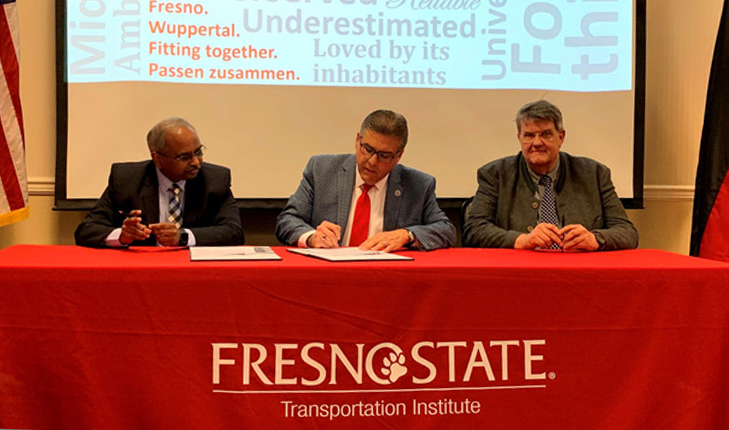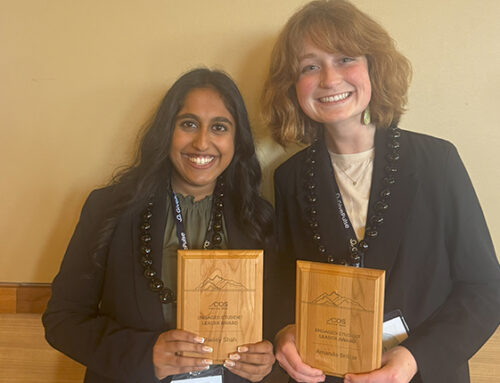Fresno State President Joseph I. Castro and University of Wuppertal (Germany) President Lambert T. Koch signed a memorandum of understanding on Nov. 13 committing to explore international joint education and research programs in transportation engineering over the next five years.
The two universities will investigate the development and feasibility of cooperative undergraduate, graduate and post-graduate study abroad programs — including master’s and doctoral degrees and a diploma in transportation sciences for professionals.
“Fresno State regularly receives exchange students from Germany through our International Business Program,” said Dr. Sarah Lam, Fresno State’s vice president for international affairs. “We also have German students in computer science, arts and design and social work. A partnership with the University of Wuppertal in engineering will further diversify the disciplines where Fresno State and German students will engage in a learning community.”
Dr. Aly Tawfik, an associate professor of civil engineering and founding director of the Fresno State Transportation Institute, will lead efforts along with other faculty and student researchers.
“The U.S. and Germany have some of the leading transportation industries in the world,” Tawfik said. “Yet, our transportation philosophies and strengths are different. By studying and living in both systems, our students would receive an exceptional educational experience; [gaining insight into] the ideological differences and identifying the strengths and weaknesses of both systems within their respective social, environmental and economic constraints.”
Tawfik said the University of Wuppertal has one of the largest transportation engineering programs in Germany. Similar to Fresno State, Wuppertal offers a variety of programs from arts and humanities to mathematics and engineering.
Established in 1972, the University of Wuppertal has three campuses located in the western Germany city of more than 350,000 people. Wuppertal is known for its Schwebebahn, a suspension monorail dating back to 1901.
“Over the last several years, both universities have made transportation programs a genuine priority on their respective campuses, in part due to the significant impacts of our current transportation systems on various economic and environmental levels. And, due to the current rapid automation evolutions influencing the transportation industry, and their expected disruptive repercussions on our ways of life,” Tawfik said.
The Fresno State Transportation Institute, housed in the Lyles College of Engineering, is an interdisciplinary institute with a focus on advanced transportation systems. It serves as a collaboration between the Lyles College, Craig School of Business, College of Social Sciences and Fresno Council of Governments. As a catalyst for the development and implementation of advanced multimodal and transit projects in Fresno County and its surrounding communities, the core mission includes education, research, technical service and public outreach.
“We hope this partnership will offer our local community unique, innovative and a highly talented and qualified workforce,” Tawfik said. “An internationally-educated, 21st century workforce could help lead our local transportation industry to an innovative future that serves all residents in our community and supports a vibrant economy, a healthy environment and a prosperous society.”





